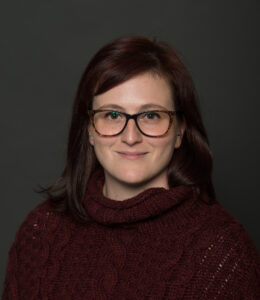【開箱大學教授】The Spirit of Innovation and Change in Teaching and Service|Corey Fernandez, Assistant Professor at Nevada State University (3)
An Educator Who Continuously Strives and Perseveres for Teaching
interview & author|Shao-Fang (Pam) Wang
Reviewer|Corey Fernandez
Choosing a Teaching-Focused Path: Balancing Responsibilities and Recommendations for Aspiring Professors

Dr. Corey Fernandez is an Assistant Professor in the Department of Psychology at Nevada State University. She completed her PhD in neuroscience at Stanford University. In this article, she shares her experience of being a professor at a comprehensive university and challenges she faces in teaching. To learn more about her academic journey, check out these two articles, “From English Literature to Cognitive Neuroscience (1) & (2).
After graduation, Corey chose to join a comprehensive university because of her strong passion for teaching. Universities in the U.S. are classified based on the Carnegie Classification system. The most well-known classification is R1, indicating a research-focused university with a mission centered around research. There are also universities that are research-focused but not to the extent of an R1, and others with different priorities. The university where Corey works is a comprehensive university, a four-year school primarily focused on teaching rather than research. Professors at different universities have varying expectations. At research universities, most of the time is spent on research, while at teaching universities, the focus is primarily on teaching and service.
Corey deeply cares about implementing best practices and effective teaching methods, and she genuinely enjoys the process of creating and enhancing courses. At a teaching-focused university, students are at the forefront of the institution's priorities, and she wanted to be in an environment where teaching is highly valued. While she still engages in research and applies for grants, it constitutes a smaller portion of her responsibilities compared to a research university where it often takes precedence. She intentionally avoided pursuing a path with grad students or a large lab, as her focus lies primarily on teaching and mentoring students.
At a comprehensive university, her time is divided between teaching, service, and research approximately as 50%, 40%, and 10%, respectively. Service involves various levels and types of involvement and is commonly overlooked by students. Professors play a significant role in the university's operations. Different departments may have varying guidelines for service, with committees being a common form of involvement. For instance, there are hiring committees, curriculum committees, and outcomes assessment committees. Moreover, there are opportunities for student-focused service, such as advising honor societies or organizing workshops for first-generation students. Recently elected to the faculty senate, Corey was chosen as a representative for her department. At higher levels, the faculty senate acts as a governing body, addressing university-wide issues and policies. Overall, service work is an essential but often overlooked aspect of academia.
She recommends that anyone considering a professorship talk to current professors about the likes and dislikes of their job. Be sure to ask them to be honest about what they don't like because everyone has aspects of their job they're not fond of. It's important to ensure you're comfortable with those aspects or can handle them. Corey also encourages students to utilize career centers or similar programs at their undergraduate or graduate institutions for mentorship and guidance. Take advantage of opportunities to learn about different career paths, such as mini-courses or fellowship programs.
In addition, quality advising during your PhD or postdoc is crucial. A professor is not just about being a good researcher; it involves many other responsibilities, such as writing grants, managing a lab, and advising students. This is actually the majority of the job a professor will be doing. Therefore, choose a mentor who can train you not only as a scientist but also in these other essential aspects of the job. It's also essential to talk to former trainees of potential advisors to assess their ability to prepare you for the job. Additionally, consider reading books on academia to gain insights into aspects you may not have considered.
Overall, Corey absolutely loves her job. It's even better than she imagined when she was a PhD student. She thoroughly enjoys teaching, creating engaging classes, and developing new courses and interactive labs. The freedom and independence in her role are unparalleled. People who become professors are those who thrive on independence and autonomy. However, it's important to acknowledge that it's also very challenging at times.
Meeting the Challenges of Teaching in a Changing Landscape: From High-Level Trends to Detailed Classroom Dynamics
To comprehend the challenges inherent in teaching, Corey believes it's essential to grasp the broader educational landscape. At a high level, teaching is challenging due to the rapid and significant changes occurring in the landscape of higher education in the United States, which are expected to continue over the next few decades. For instance, many private, small schools are struggling to survive, reflecting shifts in the perceived value of higher education. Enrollments are projected to decline steadily over the next decade due to a decrease in the number of college-aged individuals in the country. In addition, factors such as online education, the relevance of certain degrees, and the aftermath of events like COVID-19 contribute to this uncertainty. However, amidst these challenges lies a dynamic landscape that offers excitement, as it necessitates continuous learning, adaptation, and innovation. Yet, it can also evoke some apprehension, as one's current experiences and expectations may not align with the job they will have five years from now.
Additionally, being a college professor entails wearing multiple hats and adapting to various roles, from teaching and mentoring to addressing students' mental health issues. Despite the challenges, Corey finds the job rewarding, particularly in its potential to make a tangible impact on students' lives and serve as a catalyst for social justice.
At a more detailed level, teaching can be challenging due to the diverse educational backgrounds and skill sets of students in the classroom. Sometimes, there is a wide variance in student readiness. Addressing the diverse needs of students, from those already at an advanced level to those who struggle with basic study skills, presents a significant challenge for teachers. Simply teaching at a middle level does not benefit anyone; it leaves struggling students behind while boring those who are more advanced. Managing this diversity is an ongoing process that evolves over a teaching career, complicated further by external factors like pandemics and advances in technology. Corey believes that continuously adapting teaching methods and content to meet evolving student needs and preferences necessitates ongoing reflection and adjustment by educators.
To address these challenges, Corey is actively involved in researching effective teaching practices, or the Scholarship of Teaching and Learning. She acknowledges the scarcity of data and the need for experiments to address various teaching questions and support decision-making. Combining her passion for teaching with her expertise in neuroscience and psychology, Corey is spearheading ongoing research projects aimed at exploring effective teaching methods over the next few years. The primary objective is to provide data to inform teaching decisions. Educators can utilize the results to design their courses without guesswork.
For example, one project involves guided worksheets for developing skills in an introductory class to evaluate their effectiveness. Corey aims to collect data to determine if the worksheets improve not only student performance and other learning metrics but also student confidence and satisfaction. To achieve this, data will be collected from both control and treatment groups, with certain sections of the class receiving the worksheets while others do not.
Another project compares eight-week and 16-week courses to assess learning outcomes and retention rates. Some institutions offer the shorter version of courses, but it is not known if they are as effective as the longer version. This research is crucial given the demand for flexible learning options. For example, students may prefer the shorter format due to work commitments or other factors, potentially leading to faster completion rates or reduced dropout rates. However, the actual impact of these shorter courses remains uncertain. The goal is to track these students over the next few years, following their progress from foundational courses to their senior capstone projects. By examining the differences in outcomes based on the course format, the study aims to provide insights into the effectiveness of flexible learning formats in higher education.
Corey emphasizes the necessity for further research to inform pedagogical approaches. The significant but underexplored impact of different course formats on student learning outcomes highlights the importance of ongoing investigation. In addition, she stresses the importance of incorporating the student perspective into educational reforms.
After learning about her experience at the university and her research, I am very impressed by her dedication to education and her thoughtful approach to designing courses that ensure her students' learning. I am also enthusiastic about the potential impact of this research and can't wait to hear her findings in the next few years!
Understanding Educational Reform from a Scientific Research Perspective
To address these challenges, Corey is actively involved in researching effective teaching practices, or the Scholarship of Teaching and Learning. She acknowledges the scarcity of data and the need for experiments to address various teaching questions and support decision-making. Combining her passion for teaching with her expertise in neuroscience and psychology, Corey is spearheading ongoing research projects aimed at exploring effective teaching methods over the next few years. The primary objective is to provide data to inform teaching decisions. Educators can utilize the results to design their courses without guesswork.
For example, one project involves guided worksheets for developing skills in an introductory class to evaluate their effectiveness. Corey aims to collect data to determine if the worksheets improve not only student performance and other learning metrics but also student confidence and satisfaction. To achieve this, data will be collected from both control and treatment groups, with certain sections of the class receiving the worksheets while others do not.
Another project compares eight-week and 16-week courses to assess learning outcomes and retention rates. Some institutions offer the shorter version of courses, but it is not known if they are as effective as the longer version. This research is crucial given the demand for flexible learning options. For example, students may prefer the shorter format due to work commitments or other factors, potentially leading to faster completion rates or reduced dropout rates. However, the actual impact of these shorter courses remains uncertain. The goal is to track these students over the next few years, following their progress from foundational courses to their senior capstone projects. By examining the differences in outcomes based on the course format, the study aims to provide insights into the effectiveness of flexible learning formats in higher education.
Corey emphasizes the necessity for further research to inform pedagogical approaches. The significant but underexplored impact of different course formats on student learning outcomes highlights the importance of ongoing investigation. In addition, she stresses the importance of incorporating the student perspective into educational reforms.
After learning about her experience at the university and her research, I am very impressed by her dedication to education and her thoughtful approach to designing courses that ensure her students' learning. I am also enthusiastic about the potential impact of this research and can't wait to hear her findings in the next few years!

✨Further Reading:"【開箱大學教授】From English Literature to Cognitive Neuroscience|Corey Fernandez, Assistant Professor at Nevada State University (1)"&"【開箱大學教授】From English Literature to Cognitive Neuroscience|Corey Fernandez, Assistant Professor at Nevada State University (2)"
